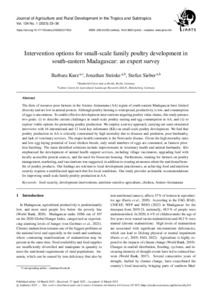| dc.date.accessioned | 2023-03-15T12:44:58Z | |
| dc.date.available | 2023-03-15T12:44:58Z | |
| dc.date.issued | 2023-03-14 | |
| dc.identifier | doi:10.17170/kobra-202302217526 | |
| dc.identifier.uri | http://hdl.handle.net/123456789/14494 | |
| dc.language.iso | eng | eng |
| dc.rights | Namensnennung 4.0 International | * |
| dc.rights.uri | http://creativecommons.org/licenses/by/4.0/ | * |
| dc.subject | food security | eng |
| dc.subject | development interventions | eng |
| dc.subject | nutrition‐sensitive agriculture | eng |
| dc.subject | chicken | eng |
| dc.subject | Atsimo-Atsinanana | eng |
| dc.subject.ddc | 630 | |
| dc.title | Intervention options for small-scale family poultry development in south-eastern Madagascar: an expert survey | eng |
| dc.type | Aufsatz | |
| dcterms.abstract | The diets of resource-poor farmers in the Atsimo Atsinanana (AA) region of south-eastern Madagascar have limited diversity and are low in animal protein. Although poultry farming is widespread, productivity is low, and consumption of eggs is uncommon. To enable effective development interventions targeting poultry value chains, this study pursues two goals: (i) to describe current challenges in small-scale poultry rearing and egg consumption in AA, and (ii) to explore viable options for promoting poultry production. We employ a survey approach, carrying out semi-structured interviews with 16 international and 12 local key informants (KIs) on small-scale poultry development. We find that poultry production in AA is critically constrained by high mortality due to diseases and predation, poor husbandry, and lack of veterinary services. The major health constraint is the Newcastle disease. Given the high mortality rates and low egg-laying potential of local chicken breeds, only small numbers of eggs are consumed, as farmers prioritise hatching. The main identified solutions include improvements in veterinary health and animal husbandry. KIs emphasised the development of animal health support services, including village vaccinators, upgrading feed with locally accessible protein sources, and the need for biosecure housing. Furthermore, training for farmers on poultry management, marketing, and vaccinations was suggested, in addition to creating awareness about the nutritional benefits of poultry products. Our findings are relevant to local development practitioners, as achieving food and nutrition security requires a multifaceted approach that fits local conditions. Our study provides actionable recommendations for improving small-scale family poultry production in AA. | eng |
| dcterms.accessRights | open access | |
| dcterms.creator | Kurz, Barbara | |
| dcterms.creator | Steinke, Jonathan | |
| dcterms.creator | Sieber, Stefan | |
| dc.subject.swd | Madagaskar (Südost) | ger |
| dc.subject.swd | Ernährungssicherung | ger |
| dc.subject.swd | Geflügelhaltung | ger |
| dc.subject.swd | Eierproduktion | ger |
| dc.subject.swd | Lebensmittelverbrauch | ger |
| dc.subject.swd | Entwicklung | ger |
| dc.subject.swd | Landwirtschaft | ger |
| dc.subject.swd | Kleinbauer | ger |
| dc.type.version | publishedVersion | |
| dcterms.source.identifier | eissn:2363-6033 | |
| dcterms.source.issue | No. 1 | |
| dcterms.source.journal | Journal of Agriculture and Rural Development in the Tropics and Subtropics (JARTS) | eng |
| dcterms.source.pageinfo | 23-36 | |
| dcterms.source.volume | Vol. 124 | |
| kup.iskup | false | |


